University of Huddersfield and the University of Northampton were among the winners at the 2019 AUDE Awards which took place on 16th April 2019 at the annual AUDE conference, this year held at the Lancaster University. Each year the awards celebrate and highlight the achievements of universities and best practice in the industry, including those who lead the way in estate and facilities management.
The full list of winners, below, highlighted exceptional work across teams, campaigns and individuals. Held at the Lancaster Institute for Contemporary Arts (LICA) and hosted by Rainer Hersch the awards recognised long-standing achievement alongside the energy and commitment of those newer to estates and facilities management. Thank you to Hoare Lea for kindly sponsoring the AUDE awards.
The awards were given in six categories:
University of Huddersfield won the Estates/Facilities Team of the Year Award
The University of Northampton (Waterside Campus Development) won the University Impact Initiative of the Year Award
The University of Leicester (Social Impact Team) won the AUDE Award for Reaching Higher
Steven Poliri of The University of Edinburgh won the AUDE Emerging Talent Award
Henry Gun-Why of Harper Adams University won the AUDE Chair’s Award for Long-Term Contribution.
AUDE also recognised the best team performance from the 2018 inaugural Summer School residential programme for aspiring higher education directors of estates.
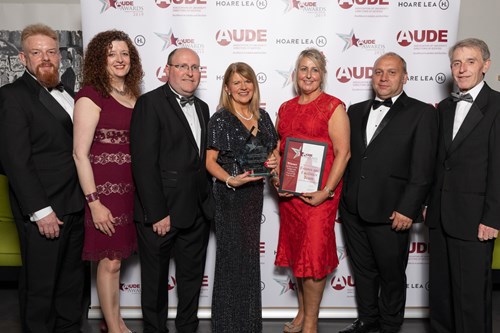
Huddersfield’s team ethic is a major contributor to their success, as made clear by Colin Blair, Director of Estates and Facilities. “It is great honour to win this award,” he said. “To run a first-class Higher Education estate, you simply must assemble a first-class team. As the inspirational Helen Keller said: ‘Alone we can do so little; together we can do so much’. I like to think we have proved this point at the University of Huddersfield and as a result we have one of the best-developed and best-maintained campuses in the sector. This brings enormous benefits to students and staff and is also a tremendous boost to the regional economy and to the local community. It is all because of teamwork.”
The award has been given for a combination of projects and measures that suggest that Huddersfield’s university estate really is one of the best-run in the country. Not only is 96% of the estate measured at RICS Condition A&B (an extraordinary improvement since 1997 of +75%); not only is the university rated as among the top ten most financially viable, with estates development funded on zero borrowings; but the team has engaged widely in intervention after intervention to improve the standard of performance.
For instance, following student feedback via the International Student Barometer Survey, it was clear that catering and sports facilities were not of a high enough standard. The answer was to invest £18m in the development of Student Central, a social and sports facility at the heart of campus, and completely reconfigure the management and leadership within these areas. Services in these areas – of vital importance to student experience – have been transformed. External audit scores on the catering service have improved by more than 25 percentage points, to a score above 90.
Huddersfield has also challenged the status quo in terms of the training of its team – starting with commitment from the top to set the example. Directors have all completed their level 7 Chartered Management Institute qualifications, and the next tier of managers is now taking this qualification. British Institute of Cleaning Standards Qualifications have been introduced and all cleaners have successfully completed this training – again impacting on staff and student perception of the working environment. In areas from social engagement to strategy, leadership skills to space management, Huddersfield’s Estates and Facilities Team is a committed and talented crew.
Jane White, AUDE’s Executive Director, said: “Huddersfield win our Team of the Year award several times over. They win for the success of Student Central. They win for role-modelling the importance of training. They win for social engagement, where their activities to support young people into permanent work, and to break down barriers to social inclusion, have made a real difference. They win for their very smart campus – flexible in use, adaptable to whatever the future brings. They achieve high student satisfaction while operating from limited space per student/staff head. They are on a roll at the moment, and in the mindset where ‘good isn’t good enough’ – a great way of pushing the standards. Our very best wishes to the whole team for their work.”
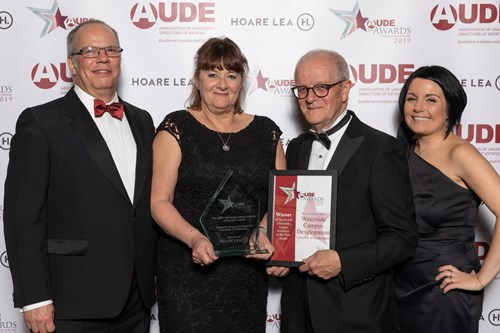
Terry Neville, Chief Operating Officer at the University of Northampton, said: “We are delighted to have won the University Impact Initiative of the Year Award. Waterside has been a mammoth undertaking over seven years and has resulted in a neglected brownfield site being transformed into a massively successful and impressive new campus which is a credit to all of those involved, the University and Northampton itself. The project hasn’t simply been a new campus development but has facilitated a radical re-engineering of the institution in terms of both teaching methodology and governance structures.”
Looking back to the conception of the development seven years ago the university estate had seemed fragmented, with accommodation split on “peripheral” campuses to the north of town. Waterside is a waterfront site of 24 hectares right on the edge of the town centre. Its successful completion has turned a sometimes derelict site into a sector-leading facility. The project brief emphasised integration – of the university into the town and local community, and of departments, facilities and teams within the university itself. New pedestrian and road bridges and cycle routes link the site to the town, and public facilities and commercial outlets are part of a waterside experience which continues beyond the university to local historic buildings and parks. Shared working spaces for staff teams and flexible cross-site working help to break down internal barriers. As a learning environment, virtually any on-site space can be used as a teaching/learning space. Tech-enabled flexibility has been the aim, and world-beating video walls are an emblem of that.
The initiative saw a reduction in the estate area of 40% with predictably significant savings in operational costs. The majority of buildings received the EPC A rating for energy efficiency while the new Energy Centre is calculated to save over 1000 tonnes of CO2 per year compared to a conventional system. More of the university’s income can be spent on the teaching experience – of core benefit to students. Different spaces have combined to enable a different teaching methodology, with a close analysis of types of space needed to deliver course modules leading to a multi-function environment that would not have been possible in the existing buildings. This flexible vision encompasses future needs, with adaptability to changing teaching delivery and student numbers all part of the project. Northampton is now a university with no formal teaching lecture theatres – the full estate is based on small-cohort delivery, with the largest classroom sized for no more than 80 students. Waterside is now an ongoing test case in redevelopment of brownfield habitats, and even in the early months since launch the site has seen an increase in bird and insect species. An ecology zone on campus allows study of the ways flora and fauna recolonise this kind of environment.
“Many people have been following this project since it first came onto the collective sector radar some years ago,” said Jane White of AUDE. “We’re delighted to see it come to fruition so brilliantly. The numbers here are radical – particularly around space saved, and inevitably, running costs reduced. There needs to be real clarity of purpose to achieve that, and here that has been around a focus on teaching ahead of more traditionally ‘governance’ structures, and a determination to break down silos. It has been a huge collaborative task that Northampton can be proud of, as can the contractors, architects and project managers involved. Waterside is genuinely a great thing for the town.”
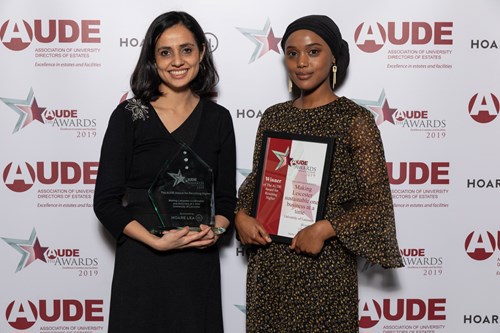
“We want to make Leicester sustainable – one business at a time.” The University of Leicester’s Innovation Hub is a bridge between the city’s business community and academics at the university, and it works with small and medium-sized enterprises (SMEs) to help them reduce their environmental impact and increase their social impact. The Hub realised that many SMEs were very interested in these areas but lacked the tools and support needed to improve their business practices. Leicester’s Social Impact Ambassadors project is a way to bring environmental management to these SME businesses via a free sustainability audit provided by trained Leicester students.
The expertise of the estates team has been shown in creating that audit tool, using their knowledge of energy, waste, biodiversity, catering and travel. The resulting audit tool is unique and is already being picked up for use by others, for instance a local sustainable festivals organisation. 14 students have been trained to deliver the audit with a target of 40 by 2020 – and they’ve learned skills along the way, just as the businesses have. The opportunity gives students both responsibility and the knowledge they are having a real-world impact and has attracted students from varying academic and cultural backgrounds who want to learn more about sustainability and business operations.
“The Social Impact Team’s audit tool is transferable as a project right across the sector,” said AUDE’s Jane White. “And all universities want to be reliable and supportive community partners within their locality – this is one way of engaging that is clearly starting to work well for Leicester. Practically giving local businesses the tools to start reducing their environmental impact is a real achievement.”
Chris Harrison, Director of Service Development and Resources, Estates and Campus Services, at The University of Leicester. Said: “We’re pleased to win this award because it demonstrates that Estates departments can make an impact in lots of ways. Our collaboration with the Innovation Hub is a great example of teams working together for the benefit of local businesses and communities and we look forward to watching the Social Impact Ambassadors project go from strength to strength.”
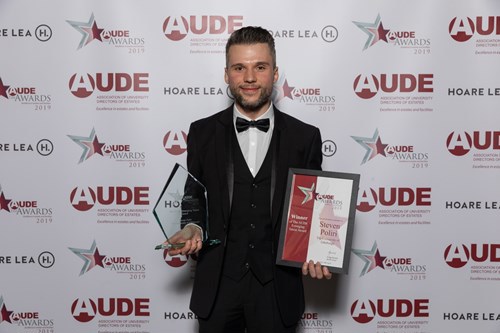
AUDE’s Emerging Talent Award is given to an individual at a relatively early stage in their estates and facilities management career who has enormous potential for the future and is already making a real impact on their university. In 2019 the Emerging Talent Award has gone to Steven Poliri of The University of Edinburgh.
“I’m honoured to be the recipient of this award and would like to thank my colleagues for their support, and AUDE for giving me the award. I work with a great team and love contributing to the positive impact that the University’s estate makes on the built environment of Edinburgh and the wellbeing of the staff, students and residents in the city,” Steven said.
Steven has worked on the delivery of a number of significant capital projects at Edinburgh, including the extension and refurbishment of the Category A Listed St Cecilia’s Hall in Edinburgh’s Old Town, the oldest purpose-built concert hall in Scotland. St Cecilia’s Hall is open five days a week to the general public and houses the university’s music collections. The project has already won prestigious awards including from the Royal Institute of Architects in Scotland (RIAS) and the Royal Incorporation of Chartered Surveyors (RICS). Steven’s current workload includes management of projects worth more than £100m, including an extension to the University Main Library and student residences.
Jane White, AUDE Executive Director, said: “It is a key part of AUDE’s work to be able to identify and support estates leaders of the future, whether through our training or through initiatives like the Emerging Talent Award. Steven has shown his skills in project management as well as his ability to work with colleagues across a large and complicated organisation like Edinburgh University. He’s shown he is aware of the value good estates management can bring to staff, to students and to the wider Edinburgh community, and we wish him well for his future in estates management.”
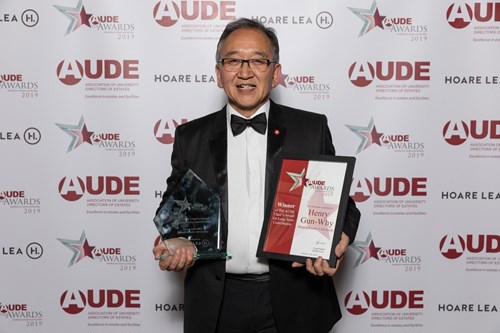
Henry is a Chartered Engineer and has worked in the HEI and Research Sectors for over 35 years. Henry has also served the University of Liverpool, University of Wolverhampton and more recently, as a client-side consultant, worked with Leeds Beckett, UCLAN and University of Edinburgh and Harper Adams University. Henry has contributed to AUDE’s Executive as the West Midlands Regional Chair and Chair of the Learning and Development Group.
Last year saw the introduction of the inaugural AUDE Summer School. The brain child of our past Chair, Keith Lilley. The residential programme nurtured emerging talent in higher education estates and FM. Delegates heard from current estates directors, industry CEOs and sector experts.
This yearlong programme and commitment also included written assignments and group research projects. The project group shown to be most impactful were crowned as winners and invited to attend this conference as well as present their work within one of the conferences workshop. The groups’ project focused on delivering integrated facilities within a more efficient and sustainable estate and had some excellent conclusions and recommendations for AUDE to adopt. AUDE are proud to announce the winners of the first summer school award is awarded to Group F - from left to right:
Peter Howells (Falmouth University), Matt Beveridge (University of Birmingham), Patrick Pereira (University of Cambridge), Helena Tinker (Manchester Metropolitan University), Grant Anderson (University of Lincoln) and Tim Wilson (University of Nottingham)
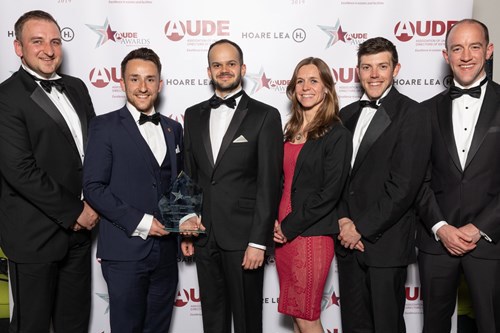
The AUDE Conference and Awards in 2020 will be held at the University of Birmingham on the 29th March - 1st April.